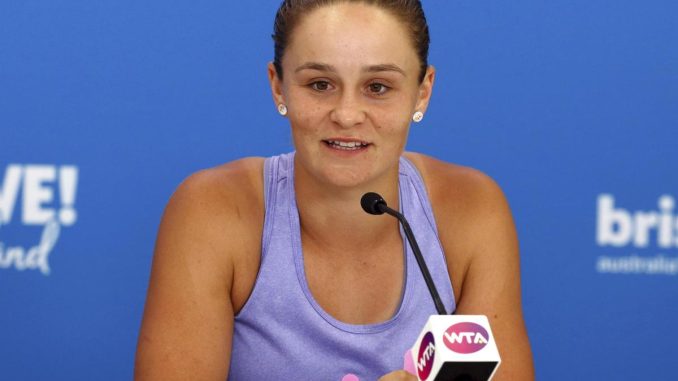
Elena Rybakina, a rising star in women’s tennis, has recently voiced her concerns over the grueling schedule imposed on players by the WTA (Women’s Tennis Association). Drawing on the example of former world number one Ashleigh Barty, who retired unexpectedly at the peak of her career, Rybakina’s criticism highlights the intense physical and mental demands placed on professional tennis players and serves as a warning to the WTA to consider the well-being of its athletes.

Elena Rybakina’s Critique
Elena Rybakina, known for her powerful serve and baseline play, has steadily ascended the WTA rankings, establishing herself as a formidable competitor on the tour. However, her rise has not been without its challenges. In various interviews, Rybakina has expressed frustration with the WTA schedule, which she believes is excessively demanding and detrimental to players’ health.
Rybakina pointed out that the packed calendar, with tournaments scheduled back-to-back across different continents, leaves little room for recovery. The lack of sufficient rest periods between tournaments can lead to physical injuries and mental burnout. Rybakina’s critique is grounded in her personal experiences, where she has often found herself struggling to maintain peak performance due to fatigue and insufficient recovery time.
Ashleigh Barty’s Example
Rybakina referenced Ashleigh Barty’s early retirement as a cautionary tale for the WTA. Barty, who retired in March 2022 at just 25 years old, was at the top of her game, having won three Grand Slam titles and secured the world number one ranking. Barty cited a desire for a different lifestyle and a need to prioritize her well-being as key reasons for her retirement.
Barty’s decision shocked the tennis world but underscored the immense pressures faced by professional players. Her choice highlighted that even the most successful athletes can reach a breaking point where the demands of the sport outweigh the rewards. By using Barty’s example, Rybakina emphasized the need for the WTA to reassess its scheduling practices to prevent further instances of early retirements due to burnout.
The Physical and Mental Toll
The physical toll of the WTA schedule is significant. Tennis players are required to maintain peak physical condition to compete at the highest level, but the constant travel, changing time zones, and varying playing surfaces add layers of complexity to their training and recovery. Injuries are common, and the pressure to return quickly can exacerbate these issues, leading to chronic problems that can shorten careers.
Mentally, the demands are equally strenuous. The pressure to perform consistently, the isolation from family and friends, and the relentless media scrutiny contribute to a high-stress environment. Mental health struggles among athletes are increasingly recognized, but the structural changes needed to support well-being are still lagging behind.
Calls for Change
Rybakina’s comments add to a growing chorus of voices calling for change within professional tennis. Advocates argue for a more balanced schedule that allows players adequate rest and recovery periods. Suggestions include reducing the number of mandatory tournaments, better aligning the calendar to minimize long travel distances, and incorporating more off-seasons where players can recover without the pressure to compete.
Additionally, there is a call for better mental health support. This could include access to sports psychologists, mandatory mental health days, and resources to help players manage the unique pressures of professional sports. These changes aim to create an environment where players can thrive both on and off the court.
WTA’s Response and Potential Impact
The WTA has acknowledged the challenges but faces a complex task in balancing the commercial and competitive aspects of the sport with player welfare. Tennis is a global sport with diverse stakeholders, including sponsors, tournament organizers, and broadcasters, each with vested interests in maintaining a packed schedule.
However, ignoring the players’ concerns could lead to a talent drain, with more players choosing to retire early or experiencing diminished performance due to burnout. The WTA needs to engage in meaningful dialogue with players and consider innovative solutions to restructure the calendar.
Conclusion
Elena Rybakina’s criticism of the WTA schedule, bolstered by Ashleigh Barty’s early retirement example, serves as a crucial reminder of the need to prioritize player well-being. As the physical and mental demands on players continue to intensify, the WTA must take proactive steps to address these issues. Ensuring a sustainable and supportive environment is essential for the longevity of players’ careers and the overall health of the sport. By heeding these warnings and making necessary adjustments, the WTA can help foster a more balanced and thriving tennis ecosystem.
Leave a Reply